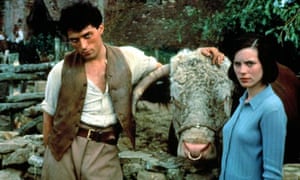Christmas at Cold Comfort Farm by Stella Gibbons – review
The 100 best novels / No 57 / Cold Comfort Farm by Stella Gibbons (1932)
Nicholas Lezard
Tuesday 29 November 2011
T
o be honest, I only picked this book up out of a mixture of curiosity and charity. Everyone loves Cold Comfort Farm, and with very good reason, but even if they know that Stella Gibbons wrote about 30 other novels and umpteen short stories, they don't read them. So although a book with a spin-off CCF story comprising 17 of its 298 pages may look as though it is exploiting a reputation, we should at least honour the creator of the Starkadders.
As it is, the Cold Comfort Farm story is very funny ("Amos, carve the bird. Ay, would it were a vulture, 'twere more fitting!"), but it certainly does stand out from the rest of the collection in terms of both subject matter (well, obviously) and approach.
The other 15 stories appeared in magazines such as the Lady, Good Housekeeping, and the Bystander. This comes as no surprise once you've read them. Recurring themes include: women who are about to leave their husbands but change their minds at the last minute; superficially dull men who turn out to be excellent choices of husband; and trendy modern people who are revealed to be vacuous twits when exposed to the unforgiving light of traditional values.This does not make them sound very appealing, and it would be foolish to gloss over the fact that there is a very small-c conservative approach at work here. However, this is a perfectly legitimate artistic impulse and, more importantly, this is Stella Gibbons, and anyone capable of writing Cold Comfort Farm is not to be dismissed. She may not be doing the rural comedy routine, but there are still flashes of great comic writing, typically occurring when secondary characters are suffering moments of high exasperation. These include the friend of a woman in the grip of an inappropriate fancy who is obliged to act as a go-between: "the wretched Dorothy, who was, by now, on the edge of collapse and fathoms deep in frightful lies …"
 |
| Down on the farm … Seth Starkadder (Rufus Sewell) and Flora Poste (Kate Beckinsale) in the BBC TV production of Cold Comfort Farm, 1995. |
And yet there is something else that makes these stories engrossing. There is, as Alexander McCall Smith says in his honest and informative introduction, the period detail. These are freshly exhumed ice-core samples from 1930s England, a time of uncertainty and unease. An ageing suffragette is interviewed by a sleek, wealthy young career woman as part of a cunning advertising campaign. "'It's sort of an indirect appeal to the shopping public. We want to persuade them to feel they're lucky to be alive in 1938.' Jenny said this with cool assurance, but as she thought of the headlines in the papers that morning she had a feeling 'they' might be a little difficult to persuade." (The suffragette, incidentally, is one of the most sympathetically drawn characters in the book, out of a large field.)But there is also the strong feeling that even though we are being taken back 70-odd years in time (there's no telly! People use libraries as a matter of daily routine!), we are still watching professional craft at work. You may have thought I was being condescending when I mentioned the Lady and Good Housekeeping, but when these publications wanted stories – and they had to have stories, because there was no telly, etc – they weren't going to print any old rubbish. The stories' twists and turns may have been foreseeable a mile off, and it wasn't as if you were going to light on a disciple of Kafka, but that was part of the point. This was entertainment according to a prescribed template, and one of the prescriptions was that the reader had to be entertained. You could do this by making her laugh or cry, or making her think that her restricted life wasn't perhaps so bad after all – but Gibbons jolly well knew what she was doing. (I also consider the 30s a golden age for popular fiction.)
I stopped reading this collection with a social historian's eye pretty quickly, and started reading it for sheer pleasure instead. And some of the dilemmas her characters face are, once you go beyond the superficial details, timeless indeed.



No comments:
Post a Comment